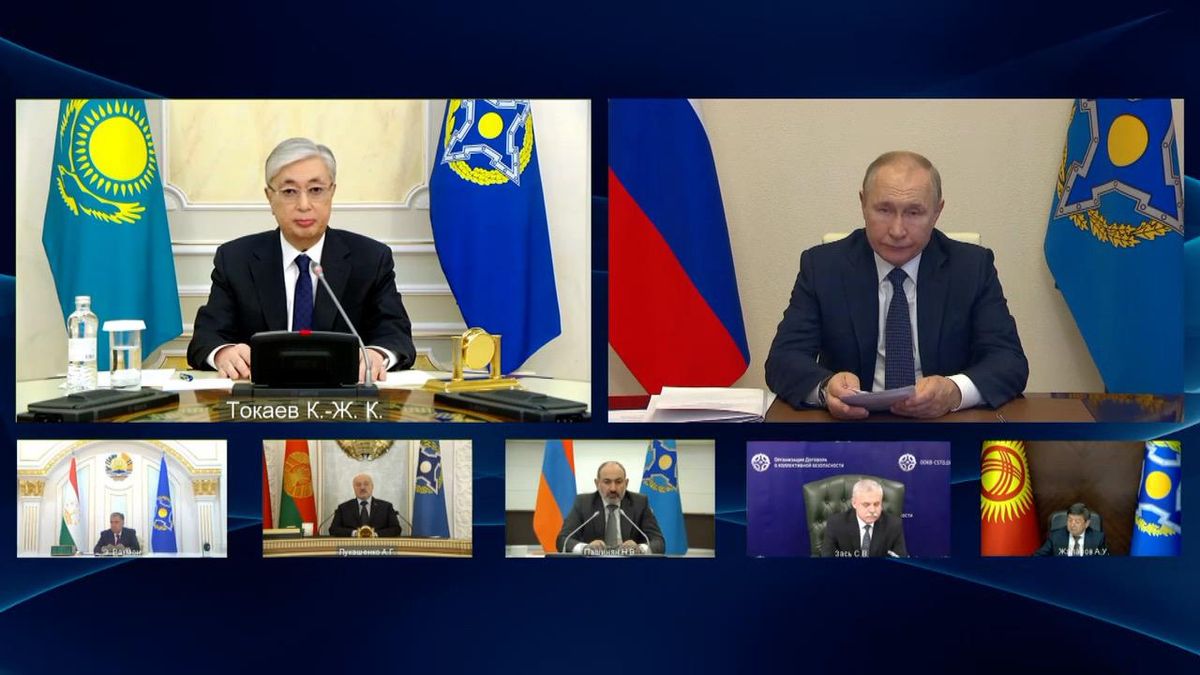The popular 2000s American political drama TV series The West Wing is famous for, among other things, its mostly accurate — albeit idealized — portrayal of the inner workings of US foreign policy. In the final season, outgoing President Jed Bartlet deploys American peacekeepers to stop a war between Russia and China over unrest in… Kazakhstan.
Right now, the Central Asian country is reeling from the worst political turmoil since it broke away from the Soviet Union in 1991. But the current crisis is so far playing out quite differently from the TV war script — in a world that’s a lot more G-Zero than it was in 2006.
First, the international peacekeepers are (mostly) Russian. Days after violent protests that began over a rapid fuel price hike and now looks like a failed coup attempt, embattled President Kassym-Jomart Tokayev feared for his survival and for the continued loyalty of the security forces. With his back against the wall, Tokayev did exactly what Putin hopes the leader of any former Soviet republic will do when in trouble: call the Kremlin, and ask for help. Russia’s leader instantly obliged, sending 2,500 troops to restore order in Kazakhstan.
Putin also got to remind everyone that Russia has its own NATO, the six-member Collective Security Treaty Organization, which for the first time agreed to dispatch CSTO troops to a member country at its request. All it took was the green light from Moscow, which in the past turned down pleas for intervention from Armenia last year and from Kyrgyzstan in 2010.
This time, though, Putin gave his consent. Tokayev now owes Putin, and the world got the message that Russia will step in to prop up Moscow-friendly leaders in neighbors facing mass unrest. Indeed, the Russian leader loves to protect fellow strongmen who need to watch their back; he supported Alexander Lukashenko in August 2020, when the Belarusian dictator was in a pickle over popular protests against his sham re-election.
(Meanwhile, all of this happens just as Russia is playing hardball with the US, demanding Washington guarantee that NATO will not expand further into former Soviet territory while dangling an invasion of Ukraine — Putin’s other playbook to get what he wants when intervening directly costs him too much.)
Second, Russia and China are quite chummy these days. Unlike almost going to war on aughts American TV, they now have a common interest in standing up to "the West." Xi Jinping, for his part, is happy to let Putin do the dirty work and get all the credit in Kazakhstan — as long as Kazakh oil, gas, and minerals keep flowing to resource-hungry China (and the Russians remain willing to cooperate if tensions arise in Central Asia).
China's hands-off approach to the crisis is also par for the course for Beijing, which prides itself on non-intervention in the domestic affairs of any country (like Russia, unless it's invited to). What’s more, Xi has bigger fish to fry at home: zero COVID, a sluggish economy, and his own future leadership.
Russia-China relations have always been tricky, and there’s a trust limit. They have clashed over borders in the past, and Moscow is perennially worried about being dwarfed economically by its more populous neighbor. But right as the US wants to push back against authoritarian states, the two most influential ones are closing ranks — in this case by endorsing Tokayev.
Third, the US is watching from the sidelines. In 2006, when The West Wing wrapped up, then-President George W. Bush would have seized the moment to nudge Kazakhstan toward democratic reform. After all, Bush viewed the earlier popular revolts in Georgia, Ukraine, and Kyrgyzstan as opportunities for democratic reform — events that Russia now derides as "color revolutions."
But those days are long gone. The US is now too preoccupied with its own democratic erosion, and even if America had any influence in Kazakhstan, there’s little public appetite for more foreign entanglements, especially after the Afghan withdrawal debacle. Washington’s strongest statement to date on the Kazakh crisis was a thinly-veiled and vanilla jibe at Moscow, which responded with a healthy dose of whataboutism.
The West Wing ended in 2006 with the US military keeping the peace between Russia and China in Central Asia. 2022 starts with Russia and to a lesser extent China calling the shots in a region that's become an afterthought for the US. Talk about a G-Zero world.

















